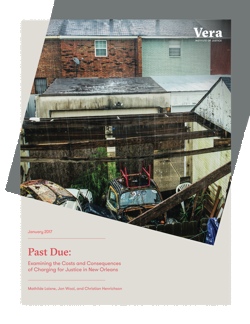Vera finds costs outweigh benefits in a “user-funded” criminal justice system
Money bail. Pretrial detention. Fines and fees. Race. Poverty. Vera connects the dots in a new report on user-funded justice in New Orleans.
by Wendy Sawyer, January 10, 2017
Money bail. Pretrial detention. Fines and fees. Race. Poverty.
Vera connects those dots today in Past Due: Examining the Costs and Consequences of Charging for Justice in New Orleans. The report provides new evidence that there are few winners in a system that punishes defendants who can’t afford to pay bail, fines and fees — and then charges taxpayers for the cost of jailing them when they can’t pay.
Like many local and state criminal justice systems, New Orleans uses bail, fines, and fees to compel the “users” of the system to pay for some of the cost of policing, prosecuting, and jailing them. In theory, these costs are meant to enhance accountability; for example, money bail is intended to ensure appearance in court, when the defendant can get his or her money back. And the fees charged to defendants at sentencing — such as court costs or probation fees — are seen as cost saving measures for services brought on by defendants themselves.
But Vera’s report lays out the deep dysfunction of the system in New Orleans. Importantly, it gives us a clear picture of who is burdened most: black residents make up 59% of the population, but paid 84% of bail bond premiums and 69% of fines and fees. And in New Orleans, black households earn less than half what white households do. These racial and economic disparities should make a user-funded scheme seem like a bad idea from the outset. In practice, Past Due shows, it’s even worse.
First, Vera’s researchers tackled bail, which they found was a requirement for most booked defendants. As we have shown before, bail is set too high for many poor defendants to pay. In New Orleans, people were detained an extra 51 days on average because, even with bail amounts as low as $100, it was hard or impossible for them to pay. On any given day, nearly one-third of the New Orleans jail is occupied by people who are there simply because they can’t afford bail.
Besides those who can’t pay bail, New Orleans must also set aside a few beds in jail for those who can’t afford the fines and fees levied upon them at sentencing. Vera found that 536 people were arrested for non-payment of criminal fines and fees in 2015, almost all for municipal cases where the average amount imposed was just $228. People interviewed and surveyed by Vera were confounded by the expectation to pay court debts when their criminal justice involvement made their financial outlook bleaker than ever. As one person said, “I understand I gotta pay the money, but how can I pay the money if I’m a convicted felon and can’t get a job?”
While Past Due confirms much of what we know about the problems with bail, fines, and fees, its value to policymakers with an eye on the bottom line is the cost-benefit analysis it provides. Vera compared how much the city of New Orleans collected from bail, fines, and fees to how much it cost to jail people who could not afford to pay, and found that the city spent $1.9 million more than it brought in. This report makes clear that reforming the systems of bail and criminal justice fines and fees is not only a moral imperative, but also financially prudent.
The potential savings from reducing the jail population “pale[s]s in comparison to the potential to reduce the human toll of jail.” In a technical report accompanying Past Due, researchers estimated the taxpayer savings of $31 per day for every person kept out of jail — compare this with the $380 daily cost of jail borne by each incarcerated person, which accounts for the risk of violence, loss of liberty, lost wages, child care, and jail fees. This is to say nothing of the net effect on the families and communities of people who are jailed.
Vera’s report urges us to question user-funded systems that transfer millions from “historically disadvantaged black communities with the least money to spare” and then lock people up when they can’t pay.




